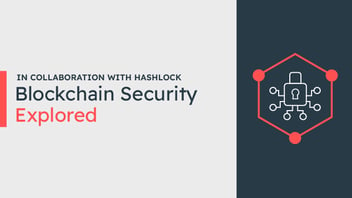Blockchain Accountability: The theory, the promise of Web3 and the gap to the regulatory reality
Blockchains differ from traditional accounting ledgers in that they use decentralised technology to ensure transparency, security and immutability.
Unlike a traditional banking ledger, typically controlled by a centralised entity, a blockchain is a decentralised ledger system that is maintained on a distributed network of computers called nodes that work together to uphold the system.
The decentralised nature of the technology has appealed to a growing decentralised community due to the trust, transparency, empowerment and inclusion it provides, as opposed to traditional centralised systems. Unfortunately, the traditional systems used by financial institutions can be prone to fraud or hacks due to their central point of failure. Blockchain transactions, however, are validated by a network of nodes to achieve consensus.
But what happens when these nodes don’t act in the interest of the wider network?
The anonymous nature of blockchains offers a layer of security for those rogue participants. Without the notion of accountability, many of these attacks go unpunished. The purpose of accountability is to elevate blockchain security, discouraging participants from engaging in misconduct.
If more blockchains built accountability into their underlying consensus mechanism, this would work as a way to identify the nodes responsible for malicious activity, and there would be more suitable options for the tokenisation of Real World Assets. However, there are few blockchains prioritising accountability in such a way as yet.
Redbelly Network stands out as the preferred platform for safeguarding high-value assets against theft or loss. Despite its open nature, Redbelly believes in accountability over anonymity, ensuring genuine user interactions by requiring users to be verified with identity credentials.
As Easy As ABC
Most people in the decentralised community are inherently sceptical of authentication processes that involve securing an off-chain identity that can be verified on-chain. Rightfully so – much of the allure around transacting in Web3 environments is centred around decentralisation. Leaving room for third party services to play a role in this process doesn’t resonate with everyone.
A solution to the problem would be an accountable consensus, which would require network participants to sign key messages. These key messages would then be cross-checked. In the event of a double spend attack, which would lead to the chain’s disagreement, the entity behind the action would be easier to identify.
Accountable Byzantine Consensus (ABC) is a way to achieve this – instead of treating the base consensus as a “black box,” ABC exposes the network participants that have submitted faulty messages. Research shows that the accountable confirmer does not worsen the communication complexity of the protocol, but rather solves the Byzantine consensus problem.
The Multi Trillion Dollar Context
What if the goal of the decentralised community of market participants is to build a revolutionary new tokenised class of regulated assets that host trillions of dollars in value? With this audacious goal, the premise of security and accountability at the consensus level is not something that can be ignored.
The tokenisation of Real World Assets (RWAs) is a concept that has recently garnered interest from heavy-weight institutional players like Blackrock, Goldman Sachs and Morgan Stanley, who have shown an appetite for exploring this market.
But if there’s one thing that sceptics of this new world of Web3 have a right to be concerned about, it’s the security of blockchains. The concern lies in the threat that those users that ensure the validity of the chain may also misuse their power. This threat cannot be understated in the context of storing high value regulated assets, where there can be no single point of failure or else trust is destroyed.
Accountability at the consensus level is an effective way to ensure that all network participants work in the blockchain’s favour. As a result the risk of a coalition attack is vastly reduced.
Redbelly vs The Rest
Existing systems of accountability in many of the popular blockchain networks rely on ‘zero trust’. Zero trust is where participants are by nature inclined to act in their own interests but without proving their identity.
Bitcoin, for instance, does not require identifying information of its users. In the early days, this led to the leading digital asset earning a reputation for being the dark web’s so-called ‘go-to currency for trading illicit goods’. Today, as the digital asset market has evolved into something far bigger with wider use cases and adoption, the pseudo-anonymous nature of Bitcoin is problematic for a different reason. The lack of accountability.
The Redbelly Network offers a solution by enforcing accountability at the protocol level. The blockchain’s consensus mechanism constructs proofs of frauds called “Polygraphs” if network participants attempt to fork the chain, and incorporates an identity layer that ensures all network participants are known.
Off-chain digital identity providers ensure that users are who they say they are before getting write access to the network. Anyone, as long as they can prove they are a real person and are not impersonating someone else, can get access. Once onboarded, users will be able to acquire and use their own set of verifiable credentials to prove claims about themselves without revealing any personal information to verifiers using a zero knowledge proof based solution.
In a way, this might take the glamour out of transacting in a completely anonymous blockchain environment. However, it opens the doors for decentralised markets to facilitate high value financial transactions and host tokenised, regulated assets.
A Future-Proof Solution for RWA Tokenisation
Many traditional blockchains typically emphasise censorship resistance. Whilst most blockchains are concerned with front running or double spend attacks as a standard, there is still much to be done to address these concerns in a way that solves the problem.
Redbelly Network is permissionless, and enforces accountability at the protocol level, which is a viable solution when facilitating high value transactions and tokenisation of Real World Assets (RWA). Both institutions and retail investors are alike in the sense that they need a secure, reliable and compliant solution for these complex processes and regulated assets; Redbelly Network is the answer.
Many traditional blockchains weren’t constructed with the notion of punishing malicious nodes, and simply weren’t created with the goal of hosting high value financial transactions.
Without the important aspect of accountability, many of these traditional blockchains will likely be the subject to regulatory scrutiny. This includes a landscape where ownership, ‘Anti-Money Laundering’, ‘Counter Terrorism Financing’ and ‘Legal Jurisdiction’ laws must be obeyed.
Decentralised market participants will soon have to face the glaring reality that the next cycle of real wealth generation in the space won’t be driven by retail investors. Rather wealth generation will be driven by institutions looking to take their regulated, tokenised assets on-chain. Embracing a forward-thinking layer 1 chain that incorporates that crucial element of accountability at the protocol level will be the first step in the right direction.
Join us as we pave the way for the future with compliant asset tokenisation, a solution that is built to last.





